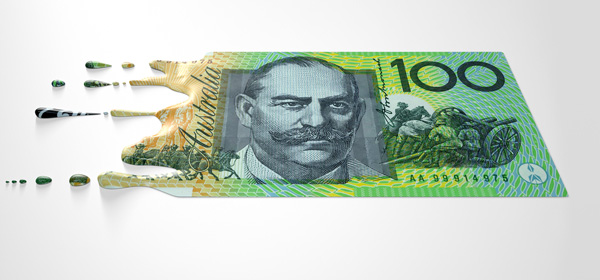The central bank yesterday confirmed that banknotes’ days are numbered, as the viability of electronic currency evolves.
Reserve Bank of Australia (RBA) Governor Phillip Lowe told the 2017 Australian Payment Summit that the central bank “has been giving considerable thought as to what the future (of currency) might look like”.
“Does the RBA intend to issue a digital form of the Australian dollar? Let’s call it an eAUD. The short answer to this question is that we have no immediate plans to issue an electronic form of Australian dollar banknotes, but we are continuing to look at the pros and cons,” Mr Lowe said.
The Governor set out four ways that electronic money could be introduced as a standard currency:
- Through banks issuing specialised accounts that did not rely on standard cash deposits for payments;
- Using an electronic form of banknote issued by the RBA and distributed by financial institutions;
- The RBA could offer every Australian an exchange settlement account with easy, low-cost payments function;
- The RBA might issue a new form of digital money – a variation on exchange settlement accounts – perhaps using distributed ledger technology.
“There will be a further significant shift to electronic payments, but there will still be a place for banknotes, although they will be used less frequently,” Mr Lowe said.
Evidence that paper money is disappearing from the economy is growing. In 2007, RBA research found that cash accounted for about 70 per cent of household transactions. Almost a decade later, this has fallen to 37 per cent.
Another measure of the decline of cash was the number of withdrawals from ATMs, which had slumped 25 per cent in the past eight years. This was coupled with a sharp uptake in paying with debit and credit cards in the same period.
Meanwhile, Mr Lowe downplayed the rise of cryptocurrencies, such as bitcoin, describing them as “more like a speculative mania than … an efficient and convenient form of electronic payment”.
The RBA will keep the introduction of electronic currency under review, saying one development it was considering was the use of “tokens” to be stored in digital wallets and used for payments in a similar way that banknotes are used.
“Another possible change that some have suggested … would be for the central bank to issue every person a bank account – for each Australian to have their own exchange settlement account with the RBA,” Mr Lowe said. “In addition to serving as deposit accounts, these accounts could be used for low-cost electronic payments.”
He said it “remained an open question” whether a strong case emerged for the development of these systems.
Opinion: Failure to regulate puts Australians’ savings at risk
While the Reserve Bank of Australia (RBA) has not necessarily pinned its colours to any electronic currency mast yet, Governor Phillip Lowe’s predisposition to allowing the private sector free rein in this space is worrying.
Throughout his speech, Mr Lowe suggested it was preferable for private financial institutions to take the lead in managing a future cash-less society.
Then in concluding, he pointed to two pressing problems that exist within the current electronic banking and payments system:
- The need to address rising rates of fraud in card-not-present transactions;
- The need to develop a strong system of digital identity that can be used in the financial sector, and perhaps elsewhere.
And again, he said he favoured private sector solutions to these fiascos, which have cost Australians millions of dollars in scams and stolen identities.
“The (RBA) board’s preference is that this progress be made by industry participants, without the need for regulation,” he said.
Without the need for regulation? Are you kidding me? How many more millions need to be stolen from Australians, mostly older ones who are specifically targeted by scammers, before a government authority steps in and reads the riot act to banking institutions?
And for a central bank to contemplate the development of an electronic currency with a distant nod and a wink is just not good enough. The RBA has more than a middling vested interest in ensuring that any system which replaces cash has processes and checks and balances in place to ensure consumers are not ripped off.
Mr Lowe said it himself: “So, while a privately issued eAUD (electronic Australian dollar) is conceivable, experience cautions that there are significant difficulties and dangers associated with privately issued fiat money.”
In fact, the day before the Governor’s address, no other than the US Securities and Exchange Commission (SEC) “warned bitcoin and other cryptocurrency investors to beware of scams and criminal activity in the sector”.
“A number of concerns have been raised regarding the cryptocurrency and initial coin offerings markets, including that, as they are currently operating, there is substantially less investor protection than in our traditional securities markets, with correspondingly greater opportunities for fraud and manipulation,” said SEC chair Jay Clayton.
But in common with Australia’s own financial authorities, the SEC is dragging its feet on regulating the emerging sector. In South Korea, on the other hand, virtual currencies have been banned.
One hopes that until consumers are confident their savings are well protected that Australia will take a leaf out of the no-nonsense South Korean book before we are all left relying on money that can so easily disappear before our very eyes.
Have you ever invested in cryptocurrencies, such as bitcoin? If so, were the returns worth it? Would you welcome a totally cash-less society? Do you miss handling money on an everyday basis?
Related articles:
Can bitcoin boost savings?
Online Visa scams
Cardless transactions on the rise

